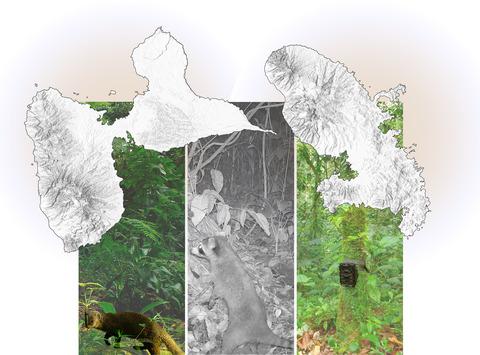Our official English website, www.x-mol.net, welcomes your
feedback! (Note: you will need to create a separate account there.)
Assessing occupancy and activity of two invasive carnivores in two Caribbean islands: implications for insular ecosystems
Journal of Zoology ( IF 1.9 ) Pub Date : 2020-11-18 , DOI: 10.1111/jzo.12845 V. Louppe 1 , A. Herrel 2 , B. Pisanu 3 , S. Grouard 4 , G. Veron 1
Journal of Zoology ( IF 1.9 ) Pub Date : 2020-11-18 , DOI: 10.1111/jzo.12845 V. Louppe 1 , A. Herrel 2 , B. Pisanu 3 , S. Grouard 4 , G. Veron 1
Affiliation

|
The introduction of exotic species is one of the major causes of the decline of global biodiversity. Tropical insular ecosystems, including many biodiversity hotspots, are particularly threatened by biological invasions. Two wild carnivores have been introduced in the Caribbean, the northern raccoon Procyon lotor and the small Indian mongoose Urva auropunctata. Understanding the spatial distribution and activity patterns of both species is crucial for conservation purposes. Here we used camera trap data to model single‐season occupancy and detection of these two species on two Caribbean islands, Guadeloupe and Martinique. Our survey highlighted the broad distribution of both species on these islands, with the exception of the northern raccoon population in Martinique which appears very limited. Moreover, spatio‐temporal co‐occurrence with other bird and mammal species revealed that the northern raccoon and the small Indian mongoose face few or no competitors. Finally, our models show that the occupancy of both species was not influenced by any variable tested (i.e. elevation, precipitation, temperature and land cover) and that the probability to detect small Indian mongooses was influenced by land cover and camera model. These results highlight the potential of both the northern raccoon and the small Indian mongoose to have a significant impact on the native ecosystems in these hotspots of biodiversity and demonstrate the necessity to develop conservation actions towards control and limitation of these invasive carnivores.
中文翻译:

评估两个加勒比岛屿中两个侵入性食肉动物的占有和活动:对岛屿生态系统的影响
外来物种的引进是全球生物多样性下降的主要原因之一。包括许多生物多样性热点在内的热带岛屿生态系统尤其受到生物入侵的威胁。在加勒比海地区已经引入了两种野生食肉动物,即北浣熊Procyon lotor和印度小猫鼬Urva auropunctata。。了解这两个物种的空间分布和活动模式对于保护目的至关重要。在这里,我们使用相机陷阱数据来模拟两个季节的瓜德罗普岛和马提尼克岛这两个物种的单季节居住和探测情况。我们的调查强调了这两个物种在这些岛屿上的广泛分布,但马提尼克岛北部的浣熊种群似乎非常有限。此外,与其他鸟类和哺乳动物物种的时空共存表明,北部浣熊和印度小猫鼬几乎没有竞争者,也没有竞争者。最后,我们的模型表明,两种物种的占用率均不受任何测试变量的影响(例如海拔,降水,温度和土地覆盖率),并且发现印度小猫鼬的可能性受土地覆盖率和相机模型的影响。这些结果凸显了北部浣熊和印度小猫鼬都可能对这些生物多样性热点地区的本地生态系统产生重大影响,并表明有必要制定保护措施来控制和限制这些侵入性食肉动物。
更新日期:2020-11-18
中文翻译:

评估两个加勒比岛屿中两个侵入性食肉动物的占有和活动:对岛屿生态系统的影响
外来物种的引进是全球生物多样性下降的主要原因之一。包括许多生物多样性热点在内的热带岛屿生态系统尤其受到生物入侵的威胁。在加勒比海地区已经引入了两种野生食肉动物,即北浣熊Procyon lotor和印度小猫鼬Urva auropunctata。。了解这两个物种的空间分布和活动模式对于保护目的至关重要。在这里,我们使用相机陷阱数据来模拟两个季节的瓜德罗普岛和马提尼克岛这两个物种的单季节居住和探测情况。我们的调查强调了这两个物种在这些岛屿上的广泛分布,但马提尼克岛北部的浣熊种群似乎非常有限。此外,与其他鸟类和哺乳动物物种的时空共存表明,北部浣熊和印度小猫鼬几乎没有竞争者,也没有竞争者。最后,我们的模型表明,两种物种的占用率均不受任何测试变量的影响(例如海拔,降水,温度和土地覆盖率),并且发现印度小猫鼬的可能性受土地覆盖率和相机模型的影响。这些结果凸显了北部浣熊和印度小猫鼬都可能对这些生物多样性热点地区的本地生态系统产生重大影响,并表明有必要制定保护措施来控制和限制这些侵入性食肉动物。











































 京公网安备 11010802027423号
京公网安备 11010802027423号